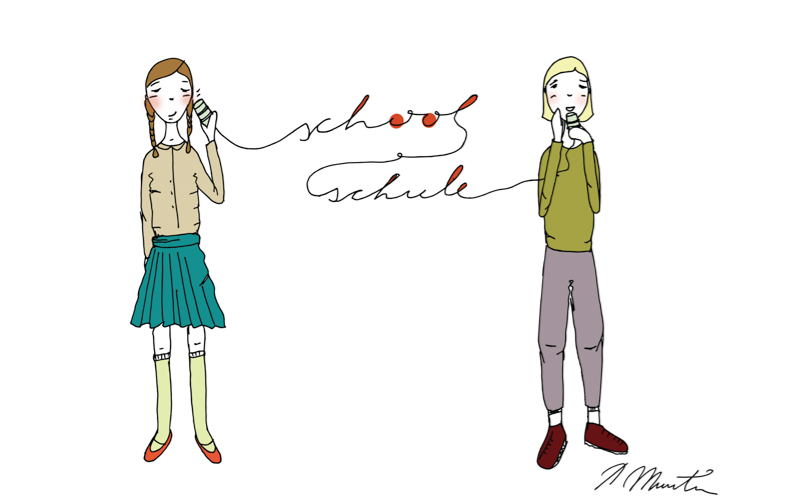Two School Languages for Your Children! …but at What Price?

In the current economic climate, international company employees are facing dramatic cuts by global employers who now only offer local Swiss contracts. Many do not include international school fees, and unless you have done your research before arriving, the compensation package can look perfectly adequate until you factor in private school fees.
In addition, the 2011 regulations duly enforced last year, which prevent children of Swiss and non-mobile families in Zurich canton from attending international schools, are starting to bite – the International School of Winterthur has closed its doors as an international school, and the ripples are being felt throughout the international community. There has never been a more conducive environment for parents to consider jumping into the living abroad project with their children’s feet first, choosing a bilingual or even a local monolingual education from the start, while keeping English as a home language.
But what does a bilingual education really mean, and if our children live a bilingual life for years, will they become disconnected from their home culture and language? Surely English is the more important language of the two, and they will need it for the rest of their lives.
I first wrote about the new bilingual schools springing up in and around Zurich after arriving here in 2005, in an article published in Swiss News. I was idealistic and optimistic (both, I have to admit, lifelong character traits of mine), and the entrepreneur in me would simply not allow a word of caution to temper my enthusiasm for these new schools, where the leadership and vision matched my multicultural spirit so closely. A large number of Swiss kindergartens, crèches and Montessori schools jumped onto the private bilingual bandwagon. Many, usually the biggest, claim that their staff members are “native speakers or equivalent,” but when you meet the teachers and childcare workers it is clearly not true. What is more worrying is that unless the educators have specific experience of working with children speaking German as a foreign language, it can take years to get an idea of your child’s prospects in a bilingual school, and by then it seems like going backwards to change to a school with an international curriculum.
I founded my own small international kindergarten in 2006, which has given me a privileged insight into the fortunes of children going through each system over the last decade. Neither state nor private bilingual options, in my view, are as clearly beneficial as they seem on the face of it, at least for English-speaking children and for those international families without a Swiss language. I am not addressing families where the school language is already spoken at home – for these bilingual families, bilingual schooling can be a perfect cultural fit. But for a monolingual English-speaking child in the German-speaking part of Switzerland, even after getting through the inevitable difficulties of adaptation, they can spend years sorting out the differences between Swiss German dialect and standard written German, which many children do not hear spoken at a local school. Your ambitious language and social integration project can divert a child altogether from the most important point of school – a broad and balanced education. In other words, even once children attend school with locals, cultural integration does not come easily, despite Zurich’s being wonderfully international. Social contact in the street will certainly be easier for the period of time you are here, but does making local friends come at the price of a life-long impact on your children’s educational prospects?
In Margaret Oertig’s book Going Local, the author presents clearly and comprehensively the information parents need if they consider not just changing to a bilingual primary school, but going the whole way and putting your child into the local state system. On English websites such as expatica.com and local.ch, bilingual or bicultural authors recommend (as I did years ago) that parents try to create their own “bilingual way.”
For children whose parents do not speak any German, French or Italian, the local route offers complete immersion, a language-learning strategy in which a large number of hours per week will inevitably result in your child learning the new language. Given the other variables in each school, it can seem attractive to choose schooling for the language acquisition, because at least that is a tangible benefit from your years in Switzerland. These days we are increasingly efficient, goal-oriented, and results-focussed. What a result if we could “make my child bilingual” in just a few years! Surely an investment for life? It also seems to make complete sense to get children started early and enable them to make friends in the language of your new home.
The problems I have seen in the ten years I have been working in the early years and primary field in Zurich are much longer-term in their development and also in their impact on results.
The first is, once you embark on a new style of education with its own curriculum, it is very hard to stop. Inertia creeps in, because the hard won battles to “settle in” are over and the tempting goal of “integration” takes quite a few years to try out. If your children have not laid the foundations of their learning by the time they embark on education in a new language, they may have not learnt how to learn. Language is closely linked with thinking, so beware of prioritising bilingualism over learning to think.
Secondly, in my experience, the barriers of language and culture sadly remain despite attending local schools. I can more wholeheartedly recommend that you join a local Verein (a sport or cultural association) to make local friends over starting at a Swiss school, if your children are young. Local people here do not expect their children to stay at the same school for long periods of time and do not expect to make family friends via their child’s school! The standard is set by children walking independently to and from school – parents are not involved.
Thirdly, bilingual schools usually follow a Swiss curriculum and therefore few have assessments in English to see how pupils who already speak English are progressing in their native tongue. The English part of the curriculum is designed for local children to become as fluent in English as possible but it is not the language in which they will be assessed when they take the eleven-plus exam to get into an academic secondary school. This puts a question mark over the global transferability of any bilingual curriculum in Zurich.
Last but not least, the standard of your child’s German has to be so high to succeed at school in German, that unless your own German becomes fluent, too, to support them and give them a good example, it will be a huge mountain to climb once they get to age eight. As Oertig says, the great divide in Swiss education between academic and vocational secondary education starts to loom already at the end of third class in the Swiss system. Even if you do manage to learn German to that level, other siblings can create an English world at home where German does not feature. Or the German at home can be of a poor standard and unhelpful to your bilingual living abroad plan. I have to end on a personal note, as my son has managed to enter the bilingual Freies Gymnasium Zurich (#proud mum). He insisted on staying in the Swiss system for his secondary education and is on track for a bilingual Matura (Swiss A-level equivalent). Imagine my feelings last weekend when my brilliant son suddenly declared he wanted to attend a top English university, not because of the Englishness but simply because it is one of the best in the world! “What do you think my chances would be, Mum? Would they be better with the IB [International Baccalaureate]?” I felt like crying and laughing at the same time.
Perhaps I should have listened to my uncle, a well-travelled multinational executive who knew that my husband was looking for work abroad in 2001 when our son was born. He had been recommending the U.S. His response when we announced that the job offer on the table was in Bern: “Switzerland? Oh my goodness, good luck! That must be one of the hardest places you could choose!” I had no idea, in those days, what he was talking about. Brave or foolish, I jumped in, regardless.
By Monica Shah
Monica Shah is the founder and head of Children First, an international daycare and early education centre. She is a developmental and educational specialist of Indian origin, born in England, a modern languages graduate who has brought up her son with three cultures in one home.
Illustration by Laura Munteanu
Laura has studied Journalism and Advertising, and has been working as a journalist and an illustrator. She has been illustrating for magazines, websites, charity and diverse campaigns. She lives in Zurich with her husband and six-year-old daughter.
References and links:
“Zurich bans locals from international schools” on swissinfo.ch
Going Local, by Margaret Oertig (2012), reviewed in Mothering Matters in 2013.
“Schools in Switzerland” on expatica.ch, accessed on 11/07/2015
“Why bilingual education is good for children” on thelocal.ch, accessed on 11/07/2015
“Bilingual education in and around Zurich” on thebilingualway.ch, accessed on 11/07/2015



